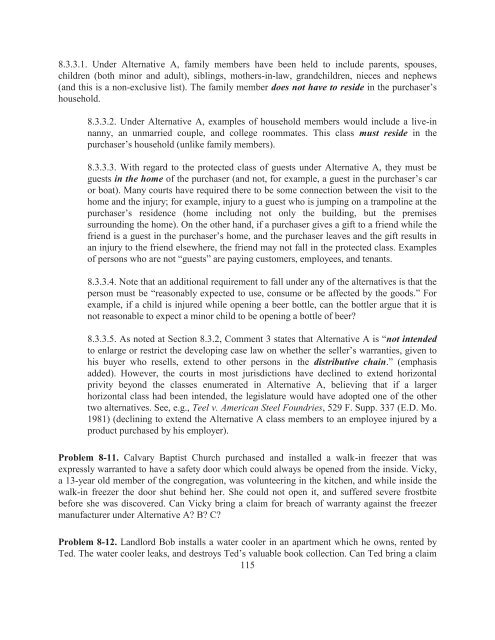Sales and Leases - A Problem-based Approach, 2016a
Sales and Leases - A Problem-based Approach, 2016a
Sales and Leases - A Problem-based Approach, 2016a
Create successful ePaper yourself
Turn your PDF publications into a flip-book with our unique Google optimized e-Paper software.
8.3.3.1. Under Alternative A, family members have been held to include parents, spouses,<br />
children (both minor <strong>and</strong> adult), siblings, mothers-in-law, gr<strong>and</strong>children, nieces <strong>and</strong> nephews<br />
(<strong>and</strong> this is a non-exclusive list). The family member does not have to reside in the purchaser’s<br />
household.<br />
8.3.3.2. Under Alternative A, examples of household members would include a live-in<br />
nanny, an unmarried couple, <strong>and</strong> college roommates. This class must reside in the<br />
purchaser’s household (unlike family members).<br />
8.3.3.3. With regard to the protected class of guests under Alternative A, they must be<br />
guests in the home of the purchaser (<strong>and</strong> not, for example, a guest in the purchaser’s car<br />
or boat). Many courts have required there to be some connection between the visit to the<br />
home <strong>and</strong> the injury; for example, injury to a guest who is jumping on a trampoline at the<br />
purchaser’s residence (home including not only the building, but the premises<br />
surrounding the home). On the other h<strong>and</strong>, if a purchaser gives a gift to a friend while the<br />
friend is a guest in the purchaser’s home, <strong>and</strong> the purchaser leaves <strong>and</strong> the gift results in<br />
an injury to the friend elsewhere, the friend may not fall in the protected class. Examples<br />
of persons who are not “guests” are paying customers, employees, <strong>and</strong> tenants.<br />
8.3.3.4. Note that an additional requirement to fall under any of the alternatives is that the<br />
person must be “reasonably expected to use, consume or be affected by the goods.” For<br />
example, if a child is injured while opening a beer bottle, can the bottler argue that it is<br />
not reasonable to expect a minor child to be opening a bottle of beer?<br />
8.3.3.5. As noted at Section 8.3.2, Comment 3 states that Alternative A is “not intended<br />
to enlarge or restrict the developing case law on whether the seller’s warranties, given to<br />
his buyer who resells, extend to other persons in the distributive chain.” (emphasis<br />
added). However, the courts in most jurisdictions have declined to extend horizontal<br />
privity beyond the classes enumerated in Alternative A, believing that if a larger<br />
horizontal class had been intended, the legislature would have adopted one of the other<br />
two alternatives. See, e.g., Teel v. American Steel Foundries, 529 F. Supp. 337 (E.D. Mo.<br />
1981) (declining to extend the Alternative A class members to an employee injured by a<br />
product purchased by his employer).<br />
<strong>Problem</strong> 8-11. Calvary Baptist Church purchased <strong>and</strong> installed a walk-in freezer that was<br />
expressly warranted to have a safety door which could always be opened from the inside. Vicky,<br />
a 13-year old member of the congregation, was volunteering in the kitchen, <strong>and</strong> while inside the<br />
walk-in freezer the door shut behind her. She could not open it, <strong>and</strong> suffered severe frostbite<br />
before she was discovered. Can Vicky bring a claim for breach of warranty against the freezer<br />
manufacturer under Alternative A? B? C?<br />
<strong>Problem</strong> 8-12. L<strong>and</strong>lord Bob installs a water cooler in an apartment which he owns, rented by<br />
Ted. The water cooler leaks, <strong>and</strong> destroys Ted’s valuable book collection. Can Ted bring a claim<br />
115


















